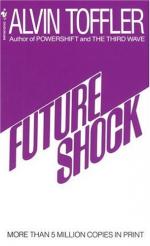
|
| Name: _________________________ | Period: ___________________ |
This test consists of 15 multiple choice questions and 5 short answer questions.
Multiple Choice Questions
1. How does Toffler describe a person's choices in the future?
(a) Abundant.
(b) Limited.
(c) Compelled.
(d) Eliminated.
2. What organizations does Toffler cite as an example of an organization that mitigates future shock?
(a) Schools.
(b) Restaurants.
(c) Hospitals.
(d) Halfway houses.
3. How does Toffler characterize society's relation with conduct, manners, and language?
(a) As a cracked consensus.
(b) As a new fascism.
(c) As a planned obsolescence.
(d) As an ad-hocracy.
4. What effect does an increasing rate of change have on the differences between age groups?
(a) It draws the ages together.
(b) It isolates the age groups from each other.
(c) It makes the ages more interdependent.
(d) It emphasizes the differences.
5. What does change require from a person's physiology?
(a) Meditation techniques.
(b) Numbing techniques.
(c) Time for healing.
(d) Expenditure of energy.
6. What is the method people use to cope with future shock?
(a) They repress any unpleasant experiences.
(b) They limit the information they take in.
(c) They acquire behavioral tics.
(d) They cling to their families.
7. What does change affect in a person's psychology?
(a) Their ability to acquire language.
(b) Their decision-making process.
(c) Their ability to orient themselves in time and space.
(d) Their ability to solve problems.
8. What does Toffler say about conduct, manners and language?
(a) They are jeopardized by mass media.
(b) There is no broad agreement about them.
(c) They are unique to each individual.
(d) They are standardized by mass media.
9. What is Toffler's premise in Future Shock?
(a) That the future will bring a return of the sins of the early industrialists.
(b) That there is a limit to how much man can adapt to.
(c) That there will be a collapse after years of prosperity.
(d) That the future will witness a new stability after years of turmoil and change.
10. What does Toffler call the decision to change lifestyle?
(a) A life-or-death decision.
(b) An important decision.
(c) A super-decision.
(d) The malady of transience.
11. What will happen if preventative steps are not taken, in Toffler's account?
(a) Society will collapse.
(b) People with power will rule unchecked.
(c) Society will be striated by class.
(d) Culture will be ruined.
12. How often does the orientation response occur?
(a) A few times a week.
(b) A few times a day.
(c) Hundreds of times a day.
(d) A few times a month.
13. How long does Toffler say it now takes for public value systems to change?
(a) Within a lifetime.
(b) Every few hundred years.
(c) Every few years.
(d) Every few generations.
14. What is the individual's relationship with the subgroup, in Toffler's account?
(a) He pledges to bring new converts to the subgroup.
(b) He subordinates his ideas to the group's.
(c) He identifies with certain characteristics and adapts them to his personality.
(d) He serves as the group's representative wherever he goes.
15. How can social change be mitigated?
(a) By restricting industrial growth.
(b) By keeping agriculture local.
(c) By examining the consequences of technology.
(d) By keeping agriculture local.
Short Answer Questions
1. What does Toffler say groups have to do?
2. In what field have some countries tried to move away from giving people free choices?
3. What is someone supposed to do once they choose their identity?
4. What does a person get from how they choose their identity?
5. What would one benefit of government involvement in change management be?
|
This section contains 559 words (approx. 2 pages at 300 words per page) |

|




